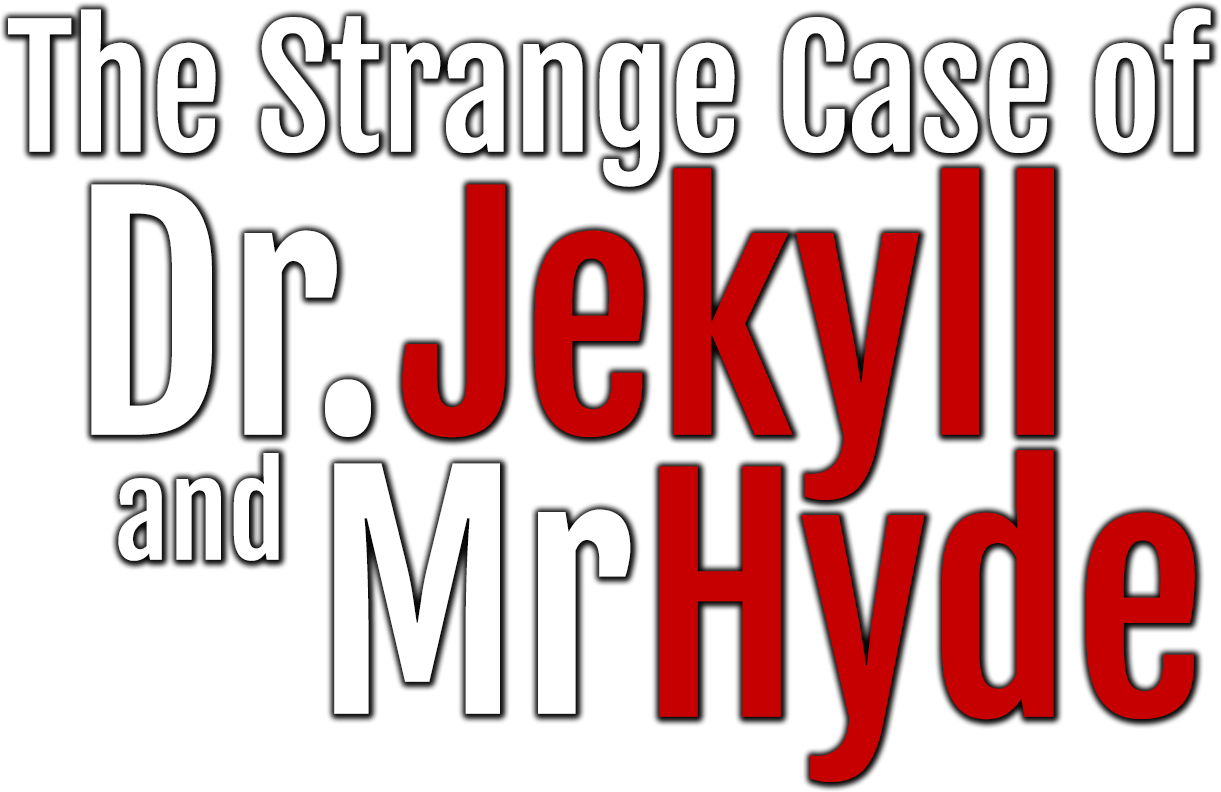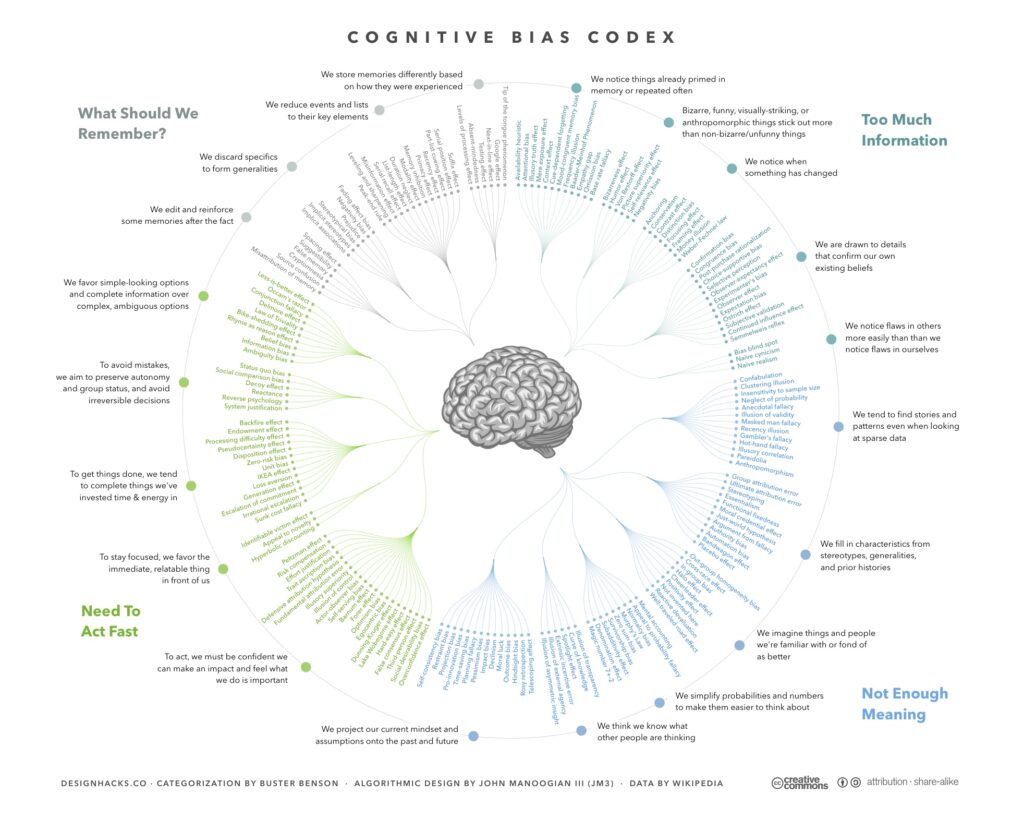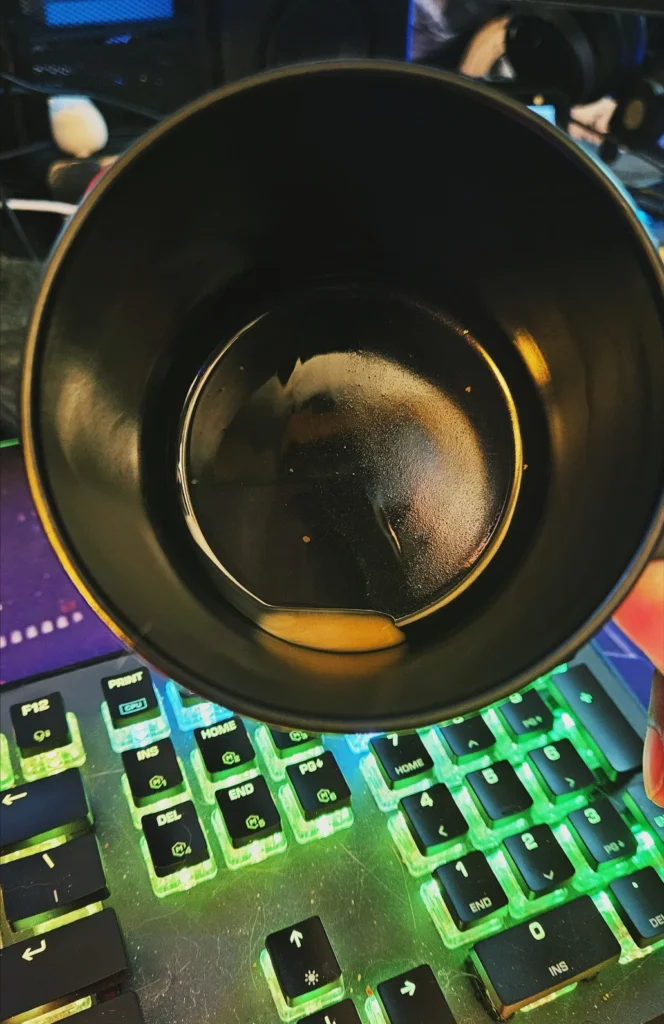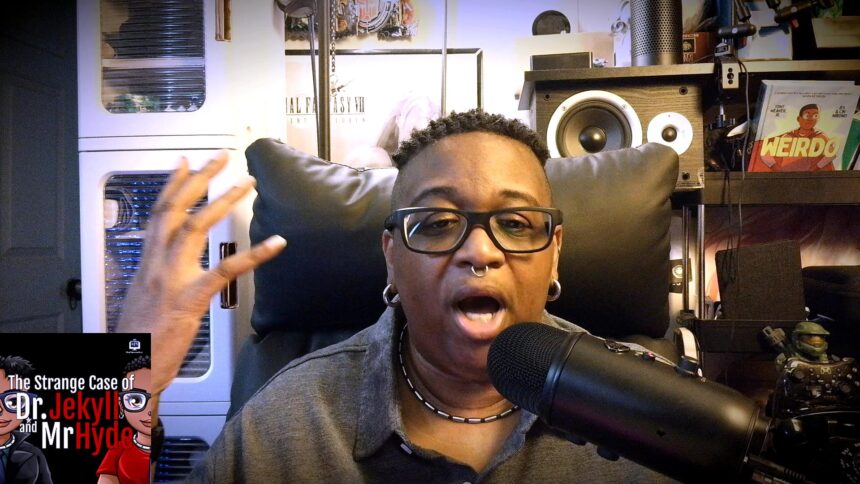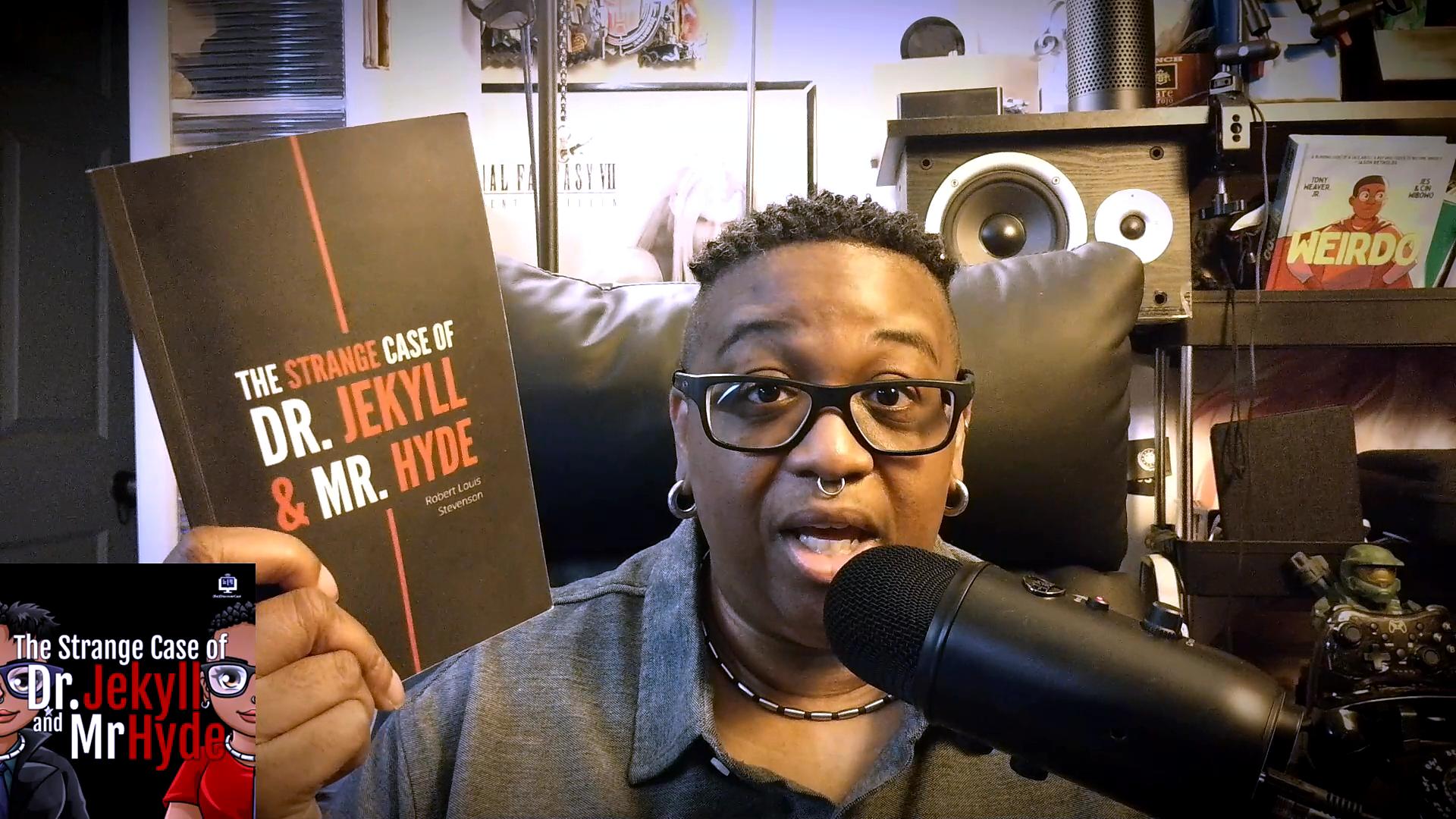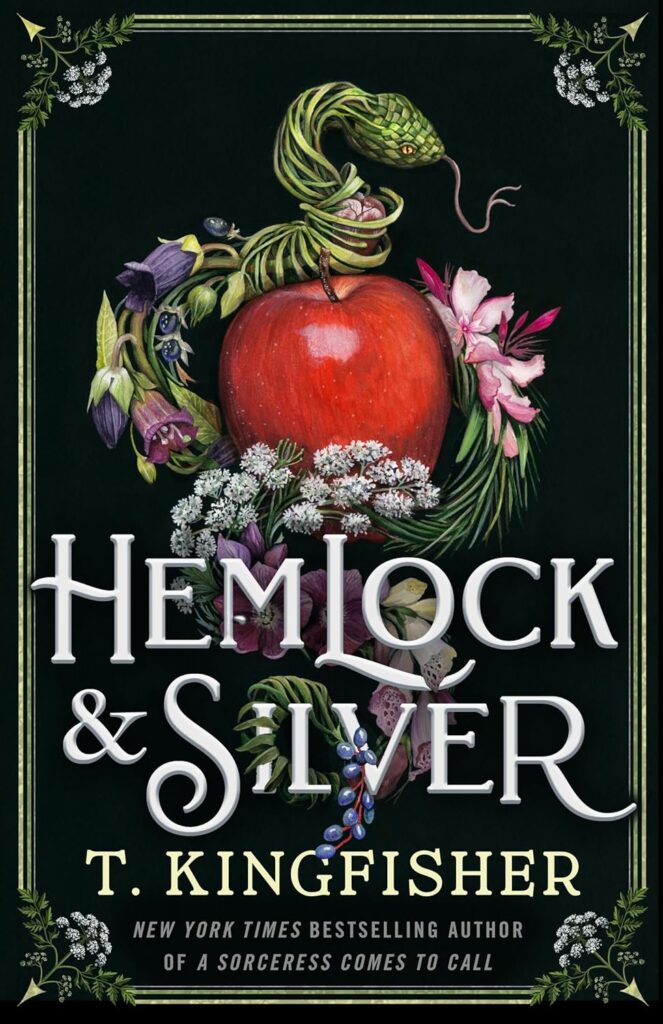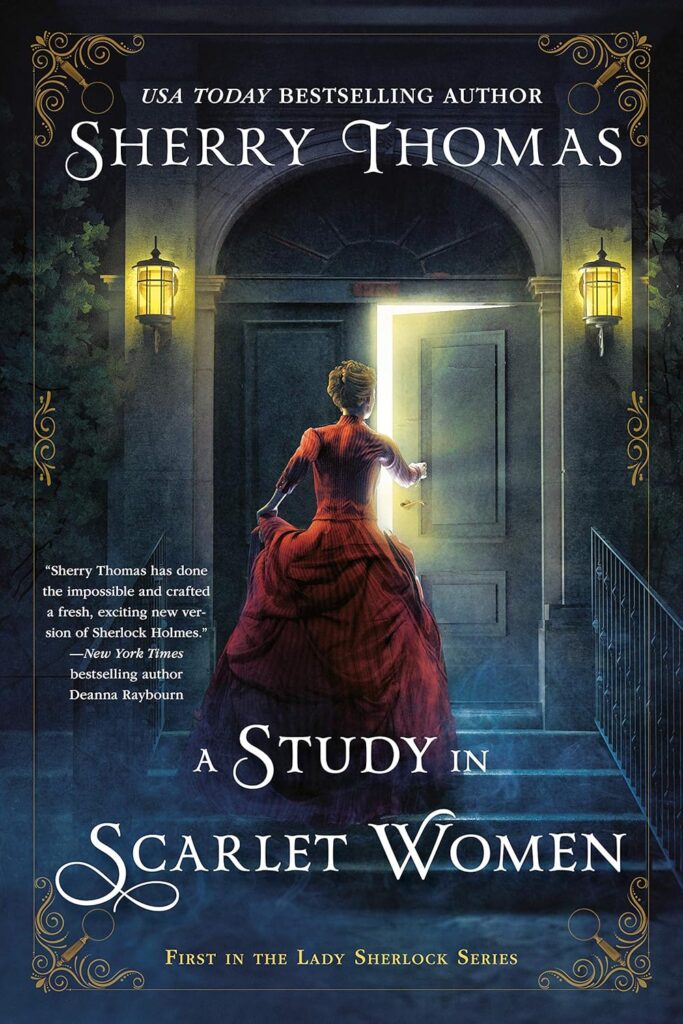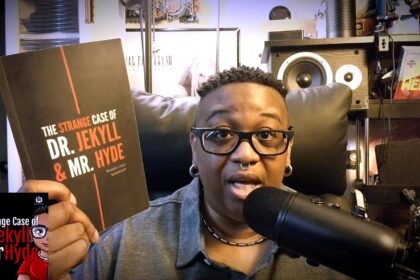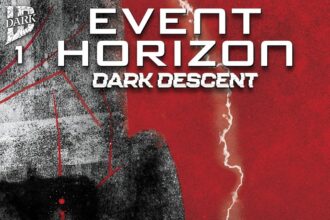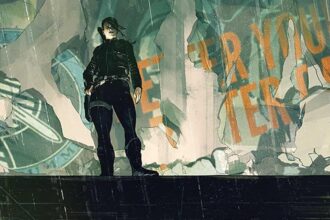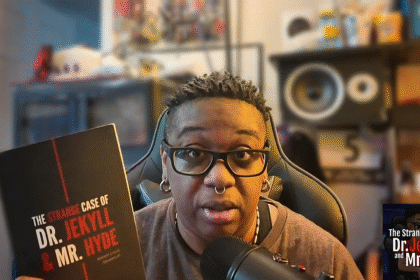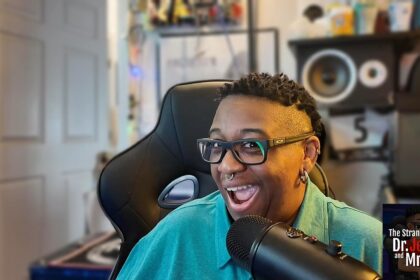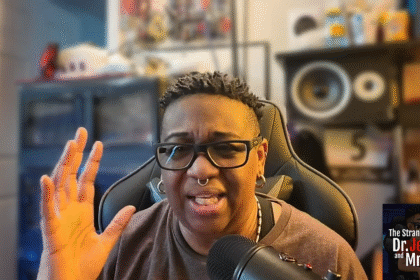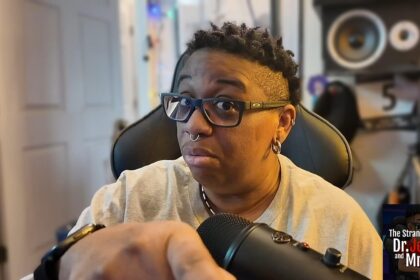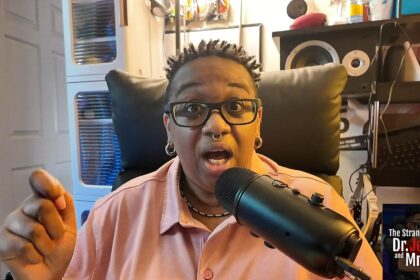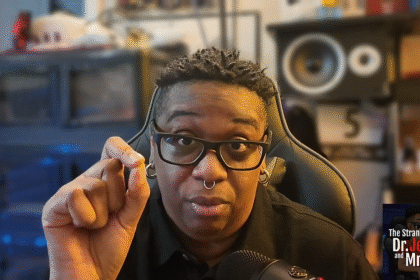The Last Night

As far as I’m concerned, Chapter 8 is the absolute best chapter in the entire book. This is where the story pretty much comes to a very abrupt end and yet it’s also where everything I love about the book finally comes front and center; Poole and Utterson.
It is a shame that the two people who have the most interesting perspectives in the entire book are the only two people to never have their stories told in any adaptations. Out of the hundreds of times this story has been adapted for stage or screen, the actual NARRATOR OF THE STORY and the only other person to genuinely care for Dr Jekyll have often been completely erased from existence. Why? When their perspective of the story is probably the most poignant.
What I hate about adaptations is that they don’t make it clear that what you’re experiencing is someone else’s fantasy or interpretation of the story, not the story itself. The Strange Case Of Dr Jekyll and Mr Hyde is a powerful story about, as I’ve said before, male friendships, loyalty, and the spiral of addiction, and yet it’s never told from that perspective and that’s a real wasted opportunity.
I hope throughout this podcast I’ve given you a new way to see this story.
Episode Transcript
[00:00:00] Welcome to Elaine is reading the Strange Case of Dr. Jekyll and Mr. Hyde, Episode 13, Chapter 8, Part 1. In this episode I am discussing my most favorite chapter in the whole book, the Last Night. It’s where everything technically comes to an end, but for me, it’s the showcase of my two favorite characters, Utterson and Poole. They are two characters who have never have their story told in any adapt.
[00:00:32] That’s a damn fucking shame, y’. All.
[00:00:48] Thanks for coming back and waiting for so long for this next chapter of the podcast. A lot of things have been going on. I’m not going to apologize because we all need to do what we need to do for ourselves. We. When crises hit and things happen, you need to, you know, make space for yourself and make space for others and just do what you need to do to be healthy and keep yourself sane. So took a little bit of time off. I had a lot of projects that I was working on that also were put on hold. But I’m trying to get back into the swing of things. And I’ve been really, really wanting to do this chapter because it’s probably one of the best chapters in the whole book. And I wanted to come at it with plenty of energy and, you know, plenty of good vibes so I could talk about it.
[00:01:39] So we are back with Dr. Jekyll, Mr. Hyde, and we are on chapter eight, which is called.
[00:01:48] Where is It? I just lost it. I think it’s called the Last Night, if I’m not mistaken.
[00:01:54] Yes, the Last Night.
[00:01:58] This is sort of long. Ish. I mean, it’s longer than some of the previous chapters. It’s not as long as the last chapter, but chapter six and seven I said were chapters I really liked and I. I do.
[00:02:15] But chapter eight is probably the best experience that you will have with this book, or maybe any book. No, I’m not going to say that. But in general, it’s a really, really well written chapter.
[00:02:33] Now, I’ve mentioned a few things throughout this podcast about the book itself, and one of the things I kind of mentioned briefly, not sure when it was, but that at one point in time while Robert Louis Stevenson was writing this novella, his wife thought it was trash and burned it.
[00:02:59] I’m not sure at what point he was in the book or whether she just burned the first manuscript or first version of it, but she actually burned the whole thing. And I don’t know if he had to just start over or just rewrite chapters or whatever, but this is a true story. You can look it up.
[00:03:19] There are a lot of inconsistencies in the book. And I think maybe it’s because of that burning that happened.
[00:03:27] The first part of the book starts out and sort of has a different feel and is written in a slightly different way than some of the other. The later chapters. And then there’s chapters where there’s a lot of description and there’s a lot more of a mood that’s trying to be set. Some other chapters are just, like, super quick and just like, little dialogue. And then at one point in the book, it even skips ahead like, a year.
[00:03:56] And that kind of gives me an indication that maybe it was maybe around that time that they just. Maybe we skipped a whole bunch of stuff and just skipped ahead a year to get to where we want to get to. I don’t know what the truth is as far as when she burned it, but something definitely happened while he was working on this because it’s not consistent throughout.
[00:04:20] That said, I feel like this is probably, out of all the chapters, the best written one, the one that has the most consistency, that gives you both mood and movement as far as where the story is going. And it also really gives you great feelings of, like, tension and nervousness and terror and all that stuff that the previous chapters don’t do individually until you get to, like, chapter seven, the last chapter that I talked about, the incident at the window, that has this mood of, what the fuck? And in a really great way.
[00:05:06] Now, I will also say again that all of the adaptations of this book are trash.
[00:05:16] And none of them give the best version or value right, for what this story actually is. I’ve said this or repeated this a million times during this podcast that anyone who ever adapts this story only seems to care about the last chapter, which is Jekyll’s diary, basically his manifesto, his diary, his account of the story.
[00:05:47] The story is not told from Jekyll’s perspective. It is told from Utterson’s perspective. Utterson is the main character of Dr. Jekyll and Mr. Hyde. I don’t know how many times I need to say this. It is not about Henry Jekyll.
[00:06:05] It is not really truly about Mr. Hyde either.
[00:06:12] This is a story about Utterson and Utterson’s experience and relationship with Dr. Henry Jekyll and subsequently Mr. Hyde. Jekyll has very little dialogue in the story. I think there’s only two chapters in the book where he actually speaks, where, you know, he’s saying something to Utterson. They have two scenes together in the entirety of the book.
[00:06:47] Hyde also kind of Shows up periodically, you know, where someone is recounting a story about.
[00:06:56] And again, he has probably about as many lines, spoken lines as maybe Jekyll does. And this is the thing about these adaptations, if you’ll notice.
[00:07:07] Same with Dracula. Everybody makes these adaptations and they give Jekyll and Hyde these huge roles. They make their adaptations all about Jekyll and Hyde, their life and the, you know, Jekyll murdering people and, sorry, Hyde murdering people and Jekyll kind of, you know, just dealing with the fallout and trying to keep his secret or whatever.
[00:07:32] With Dracula, it’s similar, if not in a more terrible way.
[00:07:39] They just eliminate half of the characters in the entire book and make the book all about Dracula.
[00:07:47] The book Dracula barely has Dracula in it. He’s maybe in the first couple of chapters.
[00:07:53] Jonathan Parker is the one having those terrifying experiences with him. And if you saw the Francis Ford Coppola one with Keanu Reeves and all those people, the beginning of him being in his castle and him crawling up the wall and his wives attacking Keanu and biting his nipple. I don’t know. That didn’t happen in the book. But anyway, that whole thing is very accurate to the actual book. Like, that stuff kind of did happen. Jonathan was there, he hung out with him for like months.
[00:08:26] And then he was like stuck there and trapped there.
[00:08:30] But for the most part, Dracula has very little presence in Dracula. He is more. It’s like the idea of him out there, right? And the entire time we’re reading Dracula and we’re reading about all these vampiric killings and dead animals showing up and all of these things that are happening, and you’re thinking, it’s Dracula. It’s actually not even Dracula who’s killing people. Dracula has long since left and is doing his own thing, like I said, buying up real estate and trying to kind of subtly take over England in the way that a conqueror would like. He’s. He’s kind of infiltrating by trying to make himself as similar to an English gentleman as possible so no one suspects him. He’s got a bunch of lawyers. He’s got all of these plans to buy up areas and to take control of England in more of a like, kind of genius financial and a real estate way.
[00:09:28] He’s not out here killing puppies and horses and women and stuff. That’s not what he’s doing. It’s very business oriented.
[00:09:35] So again, Dracula is a very different book. Dracula is about Mina and a bunch of her friends. Just like Buffy kind of going out and dealing with Shit. And trying to save people from this kind of menace that you don’t really see, but you feel.
[00:09:52] Jekyll and Hyde is similar in that it’s about Utterson dealing with a mystery, dealing with circumstances that are strange and bizarre that you couldn’t possibly think of, and just genuinely caring about his friend and trying to figure out what is going on with someone he cares deeply about and has known for a very long period of time and where that, you know, trying to solve that mystery leads him.
[00:10:19] All of these classic adaptations of a lot of these books are just wrong.
[00:10:26] And they’re basically people who didn’t like the book as it was, or people that thought they could make a better story by focusing on something that interests them. And again, I’m repeating a lot of things here, but it’s important because where we are in the book, you’ll see why I don’t have a problem with people taking adaptation or making adaptations of work or where they liked a particular character, let’s say, and they wanted to flesh out that character more and do maybe like a meta fiction. You know, kind of like the Wide Sargasso Sea is about, you know, Mr. Rochester’s wife, right. How she ended up this crazy lady in the attic in Jane Eyre. Right. And there’s been books from her perspective up in the attic. If you only read Jane Eyre, then you only know that she’s sort of this menacing presence right, in the attic and that you don’t know what’s going on. And then, you know, the sort of the finale of the book, you know, she.
[00:11:25] It turns out that that’s his wife and that he’s been keeping her up there and that she’s just batshit crazy and blah, blah, blah, blah. Right. But you don’t know anything else about her except from Jane Eyre’s perspective.
[00:11:36] So there are books about his wife. There are books. I can’t remember the one that’s literally her perspective sitting in the attic the whole time through the Jane Eyre period of time.
[00:11:48] But I like that stuff. I like taking a character that you wouldn’t normally have the perspective of and giving them a story and giving them background because you’re so interested in them. Right? That’s great. I think that’s a wonderful thing about some adaptations and things that were inspiring people, that they take a character and they’re just like, I want to know more about this person. Let’s write a book or something like that.
[00:12:16] I think that’s great. But then don’t call it Jane Eyre. Like it’s not Jane Eyre, it’s something else. Right. It wouldn’t be called Jane Eyre because it’s not Jane Eyre. It’s not about Jane Eyre. Jane Eyre is now a character in the wife’s story. But it should be called something else. Right. It should have a different title.
[00:12:34] The thing about Dracula and Jekyll and Hyde is that they don’t change the title even though those aren’t the books.
[00:12:42] They just call it Dracula even though it’s not Dracula. So if you don’t know any better and you go see a movie called Dracula or you watch a TV series called Dracula, and even though it says based on, you may still think that you’re seeing an adaptation of the book Dracula and you’re not, you’re seeing an interpretation, someone else’s interpretation of that book, of that story. You’re seeing somebody’s fantasy, you’re seeing somebody’s ego, you’re seeing somebody’s deep wish to see a different story brought to life that they thought of while reading that book or whatever it is, but you’re not seeing Dracula. And I think that is something that needs to be made clear when adaptations come out. It needs to be clear, especially, you know, for future generations or even the younger generations when they watch the Keanu Reeves, you know, version of Dracula or something. They need to be aware that this is not the book.
[00:13:47] It needs to be clear.
[00:13:49] Based on a story by Bram Stoker is not enough to really make it clear that what you are about to watch is somebody’s made up idea of what they wanted Dracula to be.
[00:14:05] That needs to be very clear.
[00:14:07] And the same with Jekyll and Hyde. Every adaptation of Jekyll and Hyde says the story of Dr. Jekyll and Mr. Hyde or just Jekyll and Hyde or just Hyde or whatever. But it all says sort of based on the story by Robert Louis Stevenson.
[00:14:22] Is it really based on the story when there’s nothing of the story in the adaptation?
[00:14:29] I don’t think so.
[00:14:32] I think that’s the furthest you could get and I wish that was more clear. Don’t call things by the names of the books. When you have completely made up what you want the story to be. I think that is a huge disservice to people, especially people who may be interested in the actual book but just haven’t read it yet or maybe are completely unaware that there’s even a book that it’s based on. Right.
[00:15:01] I did not have any experience with a lot of these classic books before I started this podcast. I was just basing my knowledge of them on the fact that I had seen so many adaptations or movies or TV versions of the story that I was pretty sure I kind of knew what the story was. And I think that’s the case for everybody who’s never read them. They think that they’re just like, oh, I’ve seen a million versions of Dracula, about the vampire and Lena and all that. And I’ve seen Jekyll and Hyde, and Jekyll is like, you know, schizophrenia or whatever, and he turns into this guy that murders people. That’s not what the story is.
[00:15:38] And I’m not trying to say that you shouldn’t watch adaptations. I’m not saying that. I’m just saying that it should be made clear when you make an adaptation, it should be clear to the audience that what you’re making or what you’re putting out for people to watch is not the book.
[00:16:01] And in some cases, not even based on the book. Even though it says based on.
[00:16:10] I think I’ve seen some adaptations that say based on characters from. And I think that’s maybe a little bit more accurate because maybe it is based on characters from, but it’s not the story.
[00:16:24] It just really irks me, now that I have read some of these great classics, that the whole time in my mind I was dealing with ideas that were false.
[00:16:39] And I think it robbed me of an opportunity to really understand these books in the way that they were meant to be understood.
[00:16:48] So, again, I don’t have a problem with directors, writers, or people who read these books and liked them and just really wanted to kind of delve in and do something a little bit different. Right. Like the Mary Riley of it. All, Right. Where you have Mary Riley is about the perspective of a maid working for Dr. Jekyll. And even though it’s not, it’s basically a love story, but the idea that you could take a character that doesn’t exist and make them exist and give them a perspective, a different perspective of. Of a classic story, I think that’s great. That’s. That’s creative. That’s.
[00:17:29] That’s amazing. Like writing a book about Edward Rochester’s wife. I mean, that’s wild because she doesn’t have a perspective. Or like Grendel, you know, which is about the perspective of, like, Grendel’s mother or whatever. Like, I think those are great, great ideas, and I would love to see somebody do different perspectives of Jekyll and Hyde, which is mostly what they do without really doing it. They just make up that they want the story to be about Henry Jekyll and they make up that they want the story to be about Edward Hyde because the story is not about really either one of them.
[00:18:05] They don’t want to make an adaptation where the story is about Edward, the person that actually narrates it and the person who ultimately has the deepest mystery and the person who kind of suffers the most. The person whom we begin and end the book with. Technically we end the book with Jekyll, but the person who drives the story for us is Utterson. And he is hardly ever featured in any adaptation.
[00:18:33] And if he is, it’s usually like his name is mentioned or something. For people who’ve read the book and be like, oh, oh, that’s Utterson. But he’s not given actual real story. And I think that’s so sad because he’s such an interesting character.
[00:18:49] So with all of that said, we get to chapter eight, which is where everything comes to an end, to be honest. Right. There’s still two more chapters left, but really everything ends in chapter eight. And I have said before that I think the book should have ended on chapter nine, which is Dr. Lanyon’s narrative.
[00:19:19] I will die on that hill that I think Dr. Jekyll and Mr. Hyde would be a great, great book if it ended chapter nine. If we never got Jekyll’s Diary of Madness. Ego, curiosity, psychosis, whatever, who cares?
[00:19:44] You could spend so much time imagining what it must have been like for this guy. And I think that’s what everybody does. They ignore the entire book and they just get fixated on what must it have been like for Jekyll to have this experience.
[00:20:03] Who cares? And every single person in the world who adapts this, that is really what they care about. All they care about is Jekyll’s perspective. Why?
[00:20:15] What is so interesting about Henry Jekyll? Absolutely nothing. When you read his diary, you get all of the information. He explains everything to you. It’s like the end of Psycho. It explains everything that he want, everything that he screwed up, everything that he was curious about how much he hated society and in a sense hated himself. And all of this stuff, it’s, it’s laid out what is left to interpret?
[00:20:45] There’s nothing, there’s no story to be told there.
[00:20:49] It’s right in front of you. It’s, it literally is explained at the end. Like you’re a 12 year old that doesn’t understand what happened in the book.
[00:20:57] I don’t know why everyone is obsessed with, with the last chapter of Jekyll and Hyde and thinks that everything they do is going to be different or unique or change it in some way. What would really be different or unique is to actually do an adaptation of Dr. Jekyll and Mr. Hyde. That’s as the book is written.
[00:21:16] That would be extraordinary to me. That would be wild. And even more wild. I would love to see somebody write a version of Dr. Jekyll and Mr. Hyde from the perspective of Poole, because that, I can tell you, would be terrifying to witness. I would write that if I had any skills whatsoever. Because Pool is. Is a fascinating perspective to tell the story from. And he never gets one.
[00:21:43] So chapter eight is called the Last Night for good reason, because this is really where we get to the end of our tale where all comes to a head and things start becoming revealed.
[00:22:01] Paul, who for the most part shows up twice, maybe three times in the book, is the main butler of Dr. Jekyll. Dr. Jekyll has a lot of servants. He’s wealthy. He’s a doctor. He’s probably got a lot of servants in his home. Poole is his head butler. So Poole is the one who’s always answering the door when Utterson shows up. He’s inviting him in. You know, he’s doing all of that stuff. We only see Pool a little bit. As far as when, you know, he opens the door and says, hello, Mr. Utterson, can I help you? Or, you know, Dr. Jekyll’s waiting for you in the drawing room or whatever, things like that. He doesn’t. He’s not like a major character. I’m not saying that he is, but I’m saying that the perspective of the head butler in Dr. Jekyll’s home would be really interesting. And I only thought that when I read this chapter.
[00:22:58] Pool shows up at Utterson’s door in the middle of the night, and he is just not okay. He’s pale, he is frightened. He is completely just terrified. And he’s like, I really need some help, right? And Utterson’s like, oh, you know, come in, sit down, have some wine, you know, to help with your nerves and tell me what’s going on. And Poole is just like, you know, he can’t really even explain it well. He’s just like you. You know, eventually he’s just like, you just need to come with me because you need to see what’s going on. But I think there’s been some foul play, okay? Something bad has happened.
[00:23:35] And I like the.
[00:23:38] The audacity, right, of a butler showing up at some lawyer’s house. Like the butler of another person traveling across the city or whatever, and knocking on the door of a lawyer and asking for help. This is something that you have to picture at a time at which this is happening. This is highly, highly unusual, okay, that this would be going on. This has to be either a serious emergency or pool has to be out of his mind. You know what I’m saying? Like the, like, you don’t just show up at some guy’s house as a butler, like, third, fourth, fifth class citizen, knocking on the door, being like, hi, I need some help.
[00:24:18] So something serious has to have happened.
[00:24:21] And something I also like about the description of this is that he says, he makes it a point to say that he. He didn’t. He offered him wine.
[00:24:40] When Utterson says, you know, that he’ll. When he agrees to go back to Dr. Jekyll’s house with him, he makes a note to say that, you know, there was a greatness of relief upon the butler’s face when he agreed to go with him, but that he noticed that the wine was still untasted, right? So we’re talking a butler, like somebody’s butler being offered a glass of rich people wine, okay, to calm his nerves, but he never drinks it.
[00:25:13] And the fact that that’s noted in the text, like, was significant to me. Like that he was so frightened and that the situation is so serious that he’s not even going to take an opportunity to drink the rich people wine. Like, he’s not gonna. He’s not gonna take this opportunity to do something that he would normally never have the opportunity to do as like, this butler, right? But he doesn’t even drink the wine. He just wants to get Utterson and get out of there and go back to Dr. Jekyll’s place. And that is really something that stood out to me. Like that one that he even showed up at all, right? Because he knew he could go to Utterson because he knew that Utterson is Jekyll’s friend, but that he didn’t drink the wine that was offered to him. And he’s like, we gotta go. Let’s go. Let’s go. Right? He’s just like, I, you don’t understand. It’s bad. Let’s go.
[00:26:05] I really, really like that. And the whole, like, sort of walk there or the journey there that they take there, like, it’s filled with such a sense of. Of dread and such a sense of, like, anticipation. And I, I really like this line that Utterson thought he had Never seen that part of London so deserted he could have wished it otherwise.
[00:26:31] Never in his life had he been so conscious of a sharp wish to see and touch his fellow creatures.
[00:26:38] For struggle as he might, there was borne in upon his mind a crushing anticipation of calamity.
[00:26:45] And I think that’s so interesting like, that. That just, like, really sucks me in. And there’s very few descriptions like this. There’s very few descriptions in the book, except when necessary, like, describing walking down an alley or the moon or whatever. But there’s not a lot of sentences like this that give you a sense of mood or terror or fear. And there’s a whole paragraph about, you know, how pool is feeling, and you know that it’s really cold, but they’re sweating from nervousness kind of thing. And that doesn’t happen too often. So when it does, like, you know, I really pay attention.
[00:27:29] There’s some serious demolition construction going on in the apartment below me. I don’t think you can hear it on the mic or in the recording. I hear it.
[00:27:41] They’re drilling, demoing walls and, like, all this stuff. But I didn’t want to put off doing this video. So I’m hoping that the noise canceling is doing its job and working really well.
[00:27:53] So I apologize if in the end, there’s a little bit of, like, weird sounds happening, but I don’t think it’s gonna. I don’t think you can hear it, but we’ll see.
[00:28:03] So they get to Dr. Jekyll’s house, and, you know, Poole knocks on the door, and there’s, like, a servant in there. It’s like, is that you? You know, and he’s like, yeah, yeah, it’s fine. And they open the door, and all the servants are, like, huddled in the. The front.
[00:28:24] I want to say it’s the front area. It says, you know, the hall. When they entered, it was brightly lighted up. The fire was built high, and about the hearth, the whole of the servants, men and women, stood huddled together like a flock of sheep.
[00:28:41] At the sight of Mr. Utterson, the housemaid broke into hysterical whimpering. And the cook crying out, BLESS God, it’s Mr. Utterson, ran forward as if to take him in her arms. And, like, the idea that as soon as he walks in, all of the house servants are all together in this one spot, just freaking out and crying, and they’re like, thank God you’re here, right? That’s like, again, significant information, right? Oh, I forgot to turn my self off. I’m looking at myself. Significant information to Tell you that there’s a real problem here. Like, this is not normal behavior. And when I read this chapter for the first time, that was when I really started thinking, like, what must this have been like working for this guy?
[00:29:36] And slowly kind of watching this messed up situation unfold, like Pool says. Like Pool’s perspective in this chapter is absolutely heartbreaking, to be honest with you.
[00:29:49] Pool says that he’s worked for Jekyll for 20 years, which means probably everybody else has been. Been there just as long, give or take. You know, some new people that they may have brought in. Or even like the way servants worked for households. Maybe some children of the servants are working there now. But Cole has been working there for 20 years. 20 years working for somebody. And again, I’m not talking about horrible, you know, treated servants. I’m talking more like an Alfred type situation where you. You love the person that you work for. And that person loves and respects you as well, right? So you’re employed by this person, but you also deeply care about them. And you know this person. You know this person so well. You have to. If you’re a good butler or a good servant, you have to know the person you’re working.
[00:30:39] You have to know your master well, what they like. Like when they come home, if they’re in a bad mood, when they need tea. When they need what? Like, you know this person so well. It’s like a marriage, right? In a way. And I think, honestly, some marriages are less than some relationships that servants have with their masters. Okay?
[00:30:58] When you’re a servant, you have to notice everything about the person you work for. You have to know that person better than you know yourself if you want to call yourself truly a good servant. Right? Pool has worked for this man for 20 years, knows exactly what is going on. And he knows there’s something wrong. And I was thinking about that the whole time reading this chapter. Like, this guy, this would be such an interesting perspective.
[00:31:23] This guy who truly, truly cares about the man he works for in the same way that Utterson cares for his friend, who cares for this man.
[00:31:34] And he is like, I know my master. I know that this is not right. I know that I. Whatever is going on, this is not him. Something has happened to him. This is bad. He needs help. And listening to him sort of plead his case to Utterson and be like, I know this sounds weird. You have to trust me. The person in that room back there is not my master. I know my master’s voice. I know his handwriting. I know everything about him. I’M telling you, it is not him. And it’s not that Utterson doesn’t believe him, but it’s just the situation is so strange. You know, Utterson’s like, well, you know, how do you know? You know, maybe he’s just not feeling well. You know, he. He does have a tendency to sort of shut himself away sometimes, you know, it’s not that he’s. He’s saying, oh, it’s bullshit. It’s just like. He’s like, there could be other things going on. And Pool is just like, I’m gonna. I’m gonna prove this to you, okay? We’re gonna go to the door.
[00:32:32] I’m going to prove it to you. Trust me, this is not him kind of thing. And I love this whole build up. And it’s partly because of Richard Armitage’s ability to narrate the way that he does, right? But, like, he’s like, you know, he’s. He’s telling all the servants to just be quiet and just like, don’t cause any. Make any noise. And he’s going to take Utterson up to the. The door where he normally knocks and, you know, asks his master if he wants dinner or whatever he’s going to do. He’s like, we’re going to go up to this door. And he’s like, come as gently as you can. He says, I want you to hear, and I don’t want you to be heard.
[00:33:11] And see here, sir, if by any chance he was to ask you in, don’t go.
[00:33:19] And again, you’re like, what in hell’s name is going on with this dude? He’s like, look, just come with me. Do not speak, but listen carefully. And if he asks you to come in, do not go in that room.
[00:33:35] And Even it says, Mr. Utterson’s nerves at this unlooked for termination gave a jerk that nearly threw him from his balance. Like, he’s so shocked, you know, by what Poole is saying. Like he’s so freaked out like that it almost knocks him off his feet. This. This response, this nervousness to what, you know, Pool saying, do not go in if he asks you to go in. Like, he. Pool is building this up, you know, in such a way that makes you, like, you know, is this real? Like he’s really being dramatic. Okay?
[00:34:07] And so Pool goes. And he knocks on the door and he says, you know, Mr. Utterson, sir, asking to see you, which is, you know, what he would normally do. You have a visitor, you know, Utterson is asking you see you A voice answered from within, tell him I cannot see anyone.
[00:34:23] And Poole’s. And it’s a thank you, Sarah, said Poole with a note of something like triumph in his voice. And he takes the candle, and he takes Utterson back out of the room and back into the kitchen.
[00:34:35] And he’s like, sir, he said, looking, you know, Mr. Utterson in the eyes. Was that my master’s voice?
[00:34:45] It seems much changed, replied the lawyer.
[00:34:51] It’s like Poole knows very well that this is not him, right? But I love that he’s. And this is what I like about pool even more, right? Because you know how you watch, like, horror movies where people, like, know something about somebody and they’re trying to fake that they don’t know, right? And you’re watching them as an audience member going, you’re not fooling anybody. Like, you’re too nervous when you talk to the person. Like, the person who knows this person murdered somebody. And they’re talking to them, and they’re just doing it badly. Like, they’re sweating, and they’re like, did. Did. Where were you yesterday? Right? And you’re like, dude, if I had to pretend, you know, that I didn’t know someone was a murderer in order to save my life, you bet your ass I would learn how to act, right? So what I like about pool is that he’s going through all the motions. He’s knocking on the door. He’s like, you know, Mr. Utterson is here to see you. And, you know, Hyde is back there. I can’t. I couldn’t say anyone, you know, like, try to disguise his voice or whatever. I tell him I can’t say. And Paul’s like, okay, no problem, you know? And then he leaves. And there’s no hint of, you know, there’s none of this BS Dramatics. Like, he’s playing his role perfectly to not give any indication that he thinks there’s something wrong. And then he takes Utterson out of the room, and then he pulls him aside and he’s like, so what do you think? Was that him? That was so not him. Right, right, right.
[00:36:10] And Uterson’s like, yeah, that didn’t really sound like him at all. Right? His voice is very changed. Now, granted, Utterson knows Jekyll has known Jekyll longer than Pool, right? And I think that’s something that it’s easy for you to forget if you don’t remember the beginning of the book where it talks about Utterson having been friends with Jekyll since their school days, right? He’s been Friends with Jekyll and Lyn in quite some time. Like, Utterson is somebody and you’re told who keeps his friends a long time. He’s very loyal, right? So he’s got friends from his school days. And what they mean is, like, probably by his university days that he’s known these men and so long before Jekyll was a doctor and famous. And whatever he’s doing now, he’s. Utterson has known him. He knows him well. He is his friend.
[00:37:05] Yes. Poole has worked for Jekyll for 20 years. And that’s a different kind of knowing, right? That’s a different knowing of someone. It’s a different relationship, right? But it’s almost even more intimate. Like you know your friends, but, like, you don’t necessarily know their footsteps or like where you can tell at a glance if you know they’re tense or you know, what preference for food they might have. Like, your friends are different. Like you know them. But serving someone is a different kind of relationship.
[00:37:42] So when you get to the end of the book, you have Poole and Utterson having this conversation about, is this my master? Is this your friend? Is this the same person that you know?
[00:37:55] And it’s so interesting to me because, again, Utterson is the main character. Utterson has taken you through this journey. It is his relationship with Jekyll that has invested you in what’s going on with Jekyll. It is not Jekyll’s perspective. It is not what Jekyll says that’s invested you in what’s going on with Jekyll. It is Utterson. It is what is going on with Utterson and even Lanyon that has invested you in what’s going on with Jekyll.
[00:38:24] I want to reiterate that if it wasn’t for Utterson telling the story the way that he does and going through the story the way that he does, you wouldn’t care about what’s going on with Jekyll.
[00:38:35] If Lanyon, you know, if what happened to Lanyon, you know, Lanyon basically dying, you know, and his perspective of Jekyll and how much he dislikes him and how much he was suffering after experience he had with Jekyll. And then he just dies. If that is what interests you in what’s going on with Jekyll. Not Jekyll himself, not Hyde, but what other people are telling you about them. That’s a completely different perspective, right?
[00:39:05] Everything you know about Jekyll and Hyde comes from what Utterson tells you. It comes from his thoughts about his friend.
[00:39:16] So to make an adaptation where you completely remove Utterson from the story and the only perspective you have is telling the story from Dr. Jekyll’s perspective or Mr. Hyde’s perspective, you’re making that perspective up.
[00:39:31] There is no perspective.
[00:39:33] When you get to the end of the book and you read Jekyll’s diary, that’s your perspective and it’s very one sided. So all you care about is what he tells you his story is and that’s what you adapt to. Me, that is just so not interesting because again, the end of the book, he tells you exactly how he feels, what he wants, what he wants to do, how bad it is, how he suffers. You get everything you need to know about Jekyll. Why would you make a movie about that?
[00:40:00] It’s right here.
[00:40:02] Isn’t there much more interesting perspectives to tell?
[00:40:06] What about Utterson? What about Poole?
[00:40:10] What about the people that know Jekyll so well, that care about him, that love him, that are watching him suffer in this way and they’re losing him in a way that they can’t understand and. And they’re watching this person that they care about just sort of drift away. And then in the end, don’t even like truly know what happens to him. By the point we get, you know, the point we get to in the chapter eight, they have no idea what’s going on. They are terrified at what’s happening to.
[00:40:45] Right, yeah. Yes, yes, yes. And I’m gonna get to that. It’s. No, no, don’t. It’s okay. Don’t be sorry. I am going to get to that. That Corey is saying that, you know, that bull, you know, knows Jekyll so well. Like he. He’s worked for him for so long, he knows exactly when shit hit the fan basically is what. What she’s saying. So when he. It’s like literally the line I’m on Corey, like, he says, sir, you know, was that my master’s voice? And Utterson says it seems much changed. And Poole says changed?
[00:41:23] Well, yes, I think so. Have I been 20 years in this man’s house to be deceived about his voice? No, sir.
[00:41:32] Masters made away with.
[00:41:34] He was made away with eight days ago when I heard him cry out upon the name of God and who’s in there instead of him and why it stays. There is a thing that cries to heaven, Mr. Utterson. And I. That line is so powerful for me. Like eight days. He knows exactly when this happened. Again, you have worked for this man for 20 years. You know this Guy better than you know yourself, you know that something changed eight days ago.
[00:42:06] Eight days ago something happened. And I like that. He’s like, have I been 20 years in this man’s house to be deceived by his voice? No, you have not, Paul. No, you have not. There is no denying this.
[00:42:21] So Utterson is kind of like, just like this is, you know, this is weird, I grant you. Like, he’s like, this is a very strange tale, you know.
[00:42:30] But I like Utterson too, because he’s very, you know, he thinks he’s not dumb by any means. None of the people in this book are dumb.
[00:42:39] None of the people in the story are like the people you watch in like some horror movies who, you know, run up the stairs instead of out the front door.
[00:42:47] That doesn’t happen here. These people have no clue. There is. Even as a reader, if you don’t know this book, if you’ve never seen an adaptation, if you’ve, if you don’t know anything about this story and you’re coming at it fresh, the book does not tell you a anything. There are no breadcrumbs. There’s no little hints to anything. There’s no, oh, you know, it looks like Mr. Hyde is wearing Dr. Jekyll’s suit. Or didn’t I give Jekyll a suit like that and why is he wearing it? There’s no breadcrumbs. There’s nothing to indicate to you that Jekyll and Hyde are related in any way, shape or form. There, there’s nothing. It is devoid of hints.
[00:43:28] It is more like buildup to give you an indication that there’s something wrong about the relationship.
[00:43:35] But you couldn’t possibly begin to fathom what that might be. And again, as far as when this book was written, you wouldn’t be able to make the leaps that you can make now. Like now when you see something that’s sort of similar to this, where someone might have a split personality or, you know, as a Jekyll and Hyde situation, you know, it’s the first thing you think of. Oh, this is like a Jekyll and Hyde situation. Well, you have to think about when there was no Jekyll and Hyde situation for you to say that when was the first time you experienced a completely new way of telling a story or a new mechanic? Right. I think about, what’s it? A Tale of Two Sisters, the Korean film. Right.
[00:44:21] I had never in my life seen a movie like that.
[00:44:25] And so when I got to the end, I was completely mind blown.
[00:44:30] There was no Way in my mind that I could have conceived of what happened happening. If you’ve never seen the original Korean tale of Two Sisters, I would tell you to watch it, but you’ll probably have it figured out because you’ve had opportunities to learn of this mechanic. Kind of like the Sixth Sense, right? Some people watched the Sixth Sense and had no idea, you know, what the twist was.
[00:44:59] Some people watched it and they kind of figured it out, right? But like, now that you have seen the Sixth Sense, anytime you see a situation similar, as far as camera, way the camera is being used, the way characters are interacting, you might have a doubt in your mind whether the person is really there or whether the person is imagining the person or whatever. Because you’ve been tricked once, right? Taylor, Two Sisters is a similar situation.
[00:45:26] You, until you know the trick, right, you don’t think about it. So Jekyll and Hyde is similar in that sense. You have to realize that you’re not being told anything. You don’t have a reference for Jekyll and Hyde. There is no such thing. Until this book is written, let’s say, right? You can’t conceive of, oh, maybe they’re the same person. Like, why would you think that? There’s no reason for you to think that in this book. There’s no indication that they could be the same person. I swear to God, I’m telling you, it doesn’t exist. The only reason people think that they’re the same person is because they’ve already seen a million versions of this story.
[00:46:06] If you come at it completely with your mind emptied and you don’t know anything about it, there’s no reason for you to think that these two people are the same person.
[00:46:19] That’s the part that you have to get past when you come at these stories. You have to get past everything that you know.
[00:46:27] You literally have to throw it out the window and put yourself in a space where you don’t know what’s going on and you have no frame of reference for what’s happening. That’s when the terror exists and the confusion and the what the hell is going on? Because this makes no sense. What’s happening to this guy?
[00:46:46] Why is he putting all. Why is he putting this man in his will? Why is he putting this man in charge of his household? Why is, you know, he acting so strange? What is it that Hyde has over him? What is this blackmail? Why does he do everything that Hyde says?
[00:47:02] It’s a weird relationship. Hyde seems like a criminal. This seems dangerous. Like there’s no way your mind is going to leap towards, oh, my God, they’re the same person.
[00:47:13] It just isn’t.
[00:47:15] It just. There’s. It’s nowhere in here. I’m telling you. This book is short as.
[00:47:20] And there’s not a lot going on in it, and there’s no indication of this. And again, it’s from Utterson’s perspective. And Utterson is not going to leap to, oh, my God, they’re the same person. That. No, there’s no way.
[00:47:30] You have to remember not to know when you read books like this or when you watch movies or when you see any kind of media that’s got like a twist or some sort of a mechanic in it that’s never been done before.
[00:47:45] You have to put yourself in a state of mind that you’ve never seen it before and you don’t know. You have to allow yourself to be fooled, right? It’s like magic.
[00:47:56] You, you, you sit and you make that determination that you know the magic is fake, but you’re going to enjoy being fooled.
[00:48:05] You’re gonna.
[00:48:06] You’re gonna allow yourself to be manipulated and it’s fine, right? And you can be manipulated. You can sit there and be like, oh, my God, wow, like, where did that pigeon come from? Or whatever, right? You. Even if you know how the trick is done, and like, a lot of people know how magic tricks are done, right? But you can still separate yourself from that knowledge and know how to be amazed, right?
[00:48:37] So it’s possible to do that with books, too. It’s possible to come at media Fresh, where you have no clue and you’re completely gonna let it just hit you for the first time.
[00:48:48] That’s what you have to do with books like Jekyll and Hyde and Dracula and other things that you may have seen adaptations of, you have to allow them to wash over you completely fresh. You have to be able to pretend you know nothing about the story in order for the story to carry the kind of weight and terror and power that it would for someone who was reading it back when it was written.
[00:49:19] And that’s hard for some people to do, but I do think it’s a necessary skill, and it’s a really good skill to have.
[00:49:27] Okay, so when Poole and Utterson are kind of huddled together in this hallway whispering about what, you know, what really happened, it’s such a strong visual for me, and I have aphantasia. So when I say something is a strong visual, it’s kind of a miracle, right, that I’m able to put together this Idea of what it must be like for these two men who deeply love this guy to be sitting here contemplating what could have possibly happened to him. And that whoever is behind that door either did something to him, right? Not even either did something to him. There’s no other explanation. Whoever’s behind the door which they discern is Mr. Hyde or determine is Mr. Hyde.
[00:50:20] Mr. Hyde killed him. Like that’s the only explanation they have. Mr. Hyde killed him and is back there pretending to be him, right? For some reason. And even Utterson says, you know, suppose it were as you suppose. This is a weird sentence to me, and I think this is something about English literature where they just don’t care. But you could never get away with this sentence now in this day and age.
[00:50:46] Suppose it were, as you suppose, supposing Dr. Jekyll to have been, well, murdered.
[00:50:52] Seriously. Suppose it were, as you suppose, supposing Dr. Jekyll had been murdered.
[00:51:00] Never would. No one would let anyone get away with this sentence, ever. I wouldn’t let myself get away with this sentence, but I love saying it. Suppose it were as you suppose, supposing Dr. Jekyll to have been murdered.
[00:51:14] What would induce the murderer to stay right?
[00:51:20] That won’t hold water. It doesn’t commend itself to reason.
[00:51:25] And it’s true. Like, okay, if.
[00:51:28] If someone is in there, if Hyde killed Jekyll, why is he still back there requesting things from the. From the apothecary every couple of days and just wandering around and weeping? Like, why would he still be in that room? It’s a fair question to ask.
[00:51:45] And pools as well. Mr. Utterson, you’re a hard man to satisfy, but I’ll do it yet.
[00:51:51] So here’s where we start getting into the what could have happened to Jekyll thing. Hold on, I need my coffee. Has been sitting here looking delicious, and it’s not okay.
[00:52:13] And again, like I just said previously, you have to kind of put yourself in the space of you don’t really know what’s going on and you’ve never read the story before.
[00:52:23] So Poole launches into this explanation about the fact that all last week, him or it, or whatever it is that lives in that cabinet. And I love that he calls it it.
[00:52:35] It’s not like he’s. I think he knows it’s Mr. Hyde. And I think that they’re saying it’s Mr. Hyde, but they refer to Mr. Hyde as an it. And he refers to this person as an it because it somehow is not his master, right? He’s like, has Been crying day and night for some sort of medicine.
[00:52:53] It can’t. It cannot get it.
[00:52:58] Here we go.
[00:53:00] Whatever it is that lives in that cabinet has been crying night and day for some sort of medicine and cannot get it to his mind.
[00:53:08] It was sometimes his way, the masters, that is, to write his orders on a sheet of paper and throw it onto the stair. We’ve had nothing else this week back. Nothing but papers and a closed door and the very meals left there to be smuggled in when no one was looking.
[00:53:27] Well, sir, every day, aye, and twice and thrice in the same day, there have been orders to. And complaints. And I have been sent flying to all the wholesale chemists in town. And every time I brought the stuff back, there would be another paper telling me to return it because it was not pure and another order for a different firm. This drug is wanted. Bitter, bad, sir, for whatever. For.
[00:53:52] And that is the longest explanation that you’re going to get for what’s going on.
[00:54:01] But at the time that this was written, right, And I think it even comes up once or twice in the. In the book, it’s possible that Jekyll is addicted to opium. Right? And, you know, that might explain kind of how he. His.
[00:54:16] His appearance and how pale and how he’s been withdrawn and all that. And so some days he appears great, and then other days he appears not so great, like he could be addicted to opium.
[00:54:29] And that’s a fair assessment, that he’s addicted to some sort of drug. He’s got some sort of drug addiction. And I said this in the last video or the one before that, like, this is about an addict. This is about having a friend who has an addiction. And you’re watching this addiction eat them alive. You’re watching them become somebody that you don’t know. You’re watching them engage in behaviors that you can’t understand and don’t make sense to you and you don’t know how to help them. This is about addiction, and it could very well be about opium. It could be a.
[00:55:03] An allegory or whatever to people who were engaged in these various types of drug addictions at the turn of the century, where we’re moving from sort of hedonistic ways and sort of free for alls and brothels to a more, you know, puritan, more religious, right Sort of thing. And that comes up in this book, too. There’s this pull between, oh, are you going religious on me? Kind of thing, where the society at the time of this book being written was definitely caught in that space.
[00:55:45] Going from this place of sort of a lot of freedom to a place of much more restriction and all this moralizing. Right.
[00:55:56] So it could be that they believe thoroughly that Jekyll is on drugs and that what he needs is some sort of anti drug to help him get off the drugs. Right. There’s no reason why you wouldn’t think this. And if you were reading it back then, I’m sure people must have thought, oh, this is, you know, he’s a drug addict. He’s. He’s on opium. He’s. He’s trapped in this horrible space and he’s addicted to this terrible drug.
[00:56:19] Makes sense to me.
[00:56:22] So Poole gives you this thing like he really needs something and every time he gets it back from the apothecary, it’s not right. And he sends me to go get more from somewhere else. Okay, that’s not abnormal. There’s nothing to indicate anything beyond this is a drug addict trying to get his drugs or trying to get better drugs or different drugs or whatever.
[00:56:44] So Mr. Utterson asks him if he has the paper, and Poole has the paper. And it says, Dr. Jekyll presents his compliments to Mrs. And Ma. So I’m assuming Mr. And Mrs. Whoever. He assures them that their last sample is impure and quite useless for his present purpose.
[00:57:07] In the year 18, blah, blah, blah, Dr. Jekyll purchased a somewhat large quantity from Messrs.
[00:57:14] M. He now begs them to search with most sedulous care, and should any of the same quality be left, forward it to him at once. Expense is no consideration. The importance of this to Dr. J can hardly be exaggerated.
[00:57:32] So far the letter had run composed enough. But here, with a sudden splutter of the pen, the writer’s emotion had broken loose. And it says, for God’s sake, find me some of the old.
[00:57:45] So again, this is a drug that Dr. Jekyll is trying to get. He had a version of it that was really good and worked really well, but now he can’t find some of the same quality. Okay, that’s basically what this is about. He’s trying to get, you know, some of the same quality of what he had before. Fair enough. Right.
[00:58:07] So it’s easy to sort of see this as a drug addiction. And in a way it is. And I’ve said this before, everything that happened to Dr. Jekyll was not planned. It was an accident. Very, very unfortunate accident that left him addicted to a drug that he now can’t get more of. Right.
[00:58:28] So all of this is about addiction. All of this is about uncontrollable addiction and how it destroys you, it destro people around you, it destroys your relationships.
[00:58:42] That’s what this is about. And I would love for somebody to adapt the story for what it is truly about. Losing the people that you love to addiction to that where they turn to terrible things, you know, and. And you’ve seen this, I’m sure, in the news or you’ve heard stories about people like, turning to desperate, you know, actions to get things that they need, like drugs, right, where they would kill someone or sell their children or whatever. Right.
[00:59:10] You know, it’s thoroughly within the realm of reason that Dr. Jekyll could be doing things desperately to get this drug right.
[00:59:19] And the people that care about him and know him well are watching him become someone that they don’t know. And that’s like Hyde, right? This, the story is not difficult to interpret.
[00:59:30] What I often see, though, are people only caring about the drug addict portion of the story. And I’m not saying that that isn’t worth telling, but how many versions of Jekyll and Hyde have we had since the publication of this book? I probably should look it up and give you a number because it’s probably been hundreds, thousands. Maybe not thousands, but there’s probably been hundreds of adaptations of this book and they all tell the same story. And you’re telling me that every single one of those stories is worth telling?
[01:00:00] Every single one of those perspectives of what it’s like to be Jekyll and Mr. Hyde is somehow new, is somehow more interesting than the other.
[01:00:09] Why will no one take the story and make it the way that it’s written, which is really interesting and also very powerful and very sad.
[01:00:19] And brings to the forefront the victims of the addict.
Thanks for listening.
